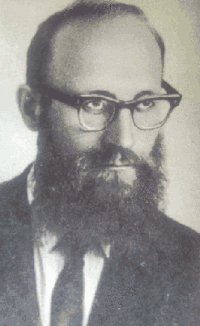William Pokhlyobkin
William Vasilyevich Pokhlyobkin (August 20, 1923 – April 15 (burial date), 2000) (Russian: Вильям Васильевич Похлёбкин, Viliyam Vasilievich Pokhlyobkin) was the foremost expert on the history of Russian cuisine and the author of numerous culinary books.[1] His A History of Vodka has been translated into a number of languages, including English. Pokhlyobkin was also an expert in the history of the diplomacy and international relations of Russia, as well as a geographer and a journalist.

Biography
William Pokhlyobkin was born to Russian revolutionary Vasili Mikhailov (Михайлов Василий Михайлович). "Pokhlyobkin" was Mikhailov's underground nickname, derived from the word "pokhlebka" or stew. Vasili named his son after Vladimir Ilyich Lenin (VIL is an acronym which turned into William).
He took part in the German-Soviet War as a private. After his discharge from service, he studied at the Moscow State Institute of International Relations from 1945–1949, and later did postgraduate courses in the Institute of History of the USSR Academy of Sciences. He became a Kandidat of Historical Sciences and a research member in the Institute of History in 1953. He founded the journal Skandinavskii sbornik ("Скандинавский сборник") and was its chief editor from 1955-1961. He was later a member of the editorial collegium of the journal Scandinavica.
In 1968 he was labeled a dissident because his book on tea was popular in dissident circles. He was barred from publication, thus was unable to finish his doctoral dissertation, and had to concentrate on his culinary hobby.[2] His book on Vodka has been criticized by Lev Usyskin for containing errors,[3] and a trademark dispute between the Soviet Union and Poland over usage of the word "vodka" that Pokhlyobkin supposedly provided research for did not occur.[4]
He was the author of over 50 books and a large number of articles. For a long time his books remained unpublished, and most of them were printed after the dissolution of the Soviet Union. Printed simultaneously in large numbers they gave rise to speculation that "Pokhlyobkin" was a pen name of a whole artel of writers.
In 1993 he was awarded Langhe Ceretto Prize, an international award for outstanding culinary writing, awarded by Ceretto Brothers winery on the basis of recommendations of an international committee.
Pokhlyobkin was found murdered in his apartment, in Podolsk somewhere between March 27 and 31, 2000. He was stabbed eleven times with a screwdriver and alcohol was found in his system despite being a teetotaler.[4] His dead body was uncovered by the chief editor of the Polyfakt publishing house, who was worried about the delay of the book Cuisine of the Century and came from Moscow to Podolsk to see Pokhlyobkin. A large number of his books on Scandinavian topics remain unpublished.
See also
Bibliography
- V. V. Pokhlebkin, Istoriya Vodki, Inter-Verso, Moscow (softcover 1991)
- William Pokhlebkin, Renfrey Clarke, and V. V. Pokhlebkin, A History of Vodka, Verso Books (hardcover, December, 1992, ISBN 0-86091-359-7).
- Большая энциклопедия кулинарного искусства, М.: Центрполиграф, 2003, ISBN 5-227-01728-X, ISBN 5-9524-0274-7 (a collection of all culinary works of Pokhlebkin)
- Из истории русской кулинарной культуры. – М.: Центрполиграф, 1997
- История важнейших пищевых продуктов. – М.: Центрполиграф, 1997
- Кулинарный словарь. – М.: Центрполиграф, 1997
- Национальные кухни наших народов. – М.: Центрполиграф, 1997
- Поваренное искусство и поварские приклады. – М.: Центрполиграф, 1997
- Занимательная кулинария. – М.: Центрполиграф, 1999
- Моя кухня и мое меню. – М.: Центрполиграф, 1999
- Поваренное искусство. – М.: Центрполиграф, 1999
- Тайны хорошей кухни. – М.: Центрполиграф, 1999
- Кушать подано! (Kitchen of classical Russian dramaturgy)
- Занимательная кулинария.
- Все о пряностях
- Кухни славянских народов
- Кухня века
- Чай: Его типы, свойства, употребление. – М.: Центрполиграф, 2001
- Репертуар кушаний и напитков в русской классической драматургии с конца XVIII до начала XX столетий
- Кухни закавказских и среднеазиатских народов, 2005
- Книга о вкусной и здоровой пище
- Чай и водка в истории России
- Татары и Русь. 360 лет отношений Руси с татарскими государствами в XIII-XVI вв., 1238-1598 гг. (От битвы на реке Сить до покорения Сибири), 1985
- Внешняя политика Руси, России, СССР за 1000 лет в именах, датах и фактах, 1992
- Выпуск I. Внешнеполитические ведомства и их руководители.
- Выпуск II. Войны и мирные договоры.
- Книга 1. Европа и Америка в IX—XIX вв.
- Книга 2. Страны Азии в XIII—XX вв.
- Книга 3. Европа в первой половине XX в.
- Словарь международной символики и эмблематики
- Государственный строй Исландии
- Великий псевдоним (about Joseph Stalin's name)
- Войны и мирные договора, 1995
- Урхо Калева Кекконен
- Viljam Pohljobkin, Urho Kaleva Kekkonen, 1988, ISBN 5-450-00049-9 (in Estonian)
- Столицы России, 1997
- СССР — Финляндия: 260 лет отношений 1713—1973 гг.»,
- Ю.К.Паасикиви и Советский Союз
- Финляндия как враг и как друг
- Великая война и не состоявшийся мир, 1997
References
- "Щи да каша - Культура - Новая Газета". Новая Газета. Retrieved 1 October 2014.
- "Circumstances of creation of books on particular products (article in Russian)". Retrieved 1 October 2014.
- Усыскин, Лев. Журналистика: ремесло и профессия (in Russian). Gefter.ru. Retrieved 3 May 2016.
- Mark Schrad (March 2014). Vodka Politics: Alcohol, Autocracy, and the Secret History of the Russian State. OUP USA. ISBN 978-0-19-975559-2.
External links
- Pokhlebkin murdered (in Russian)
- Interview by Radio Liberty (in Russian)